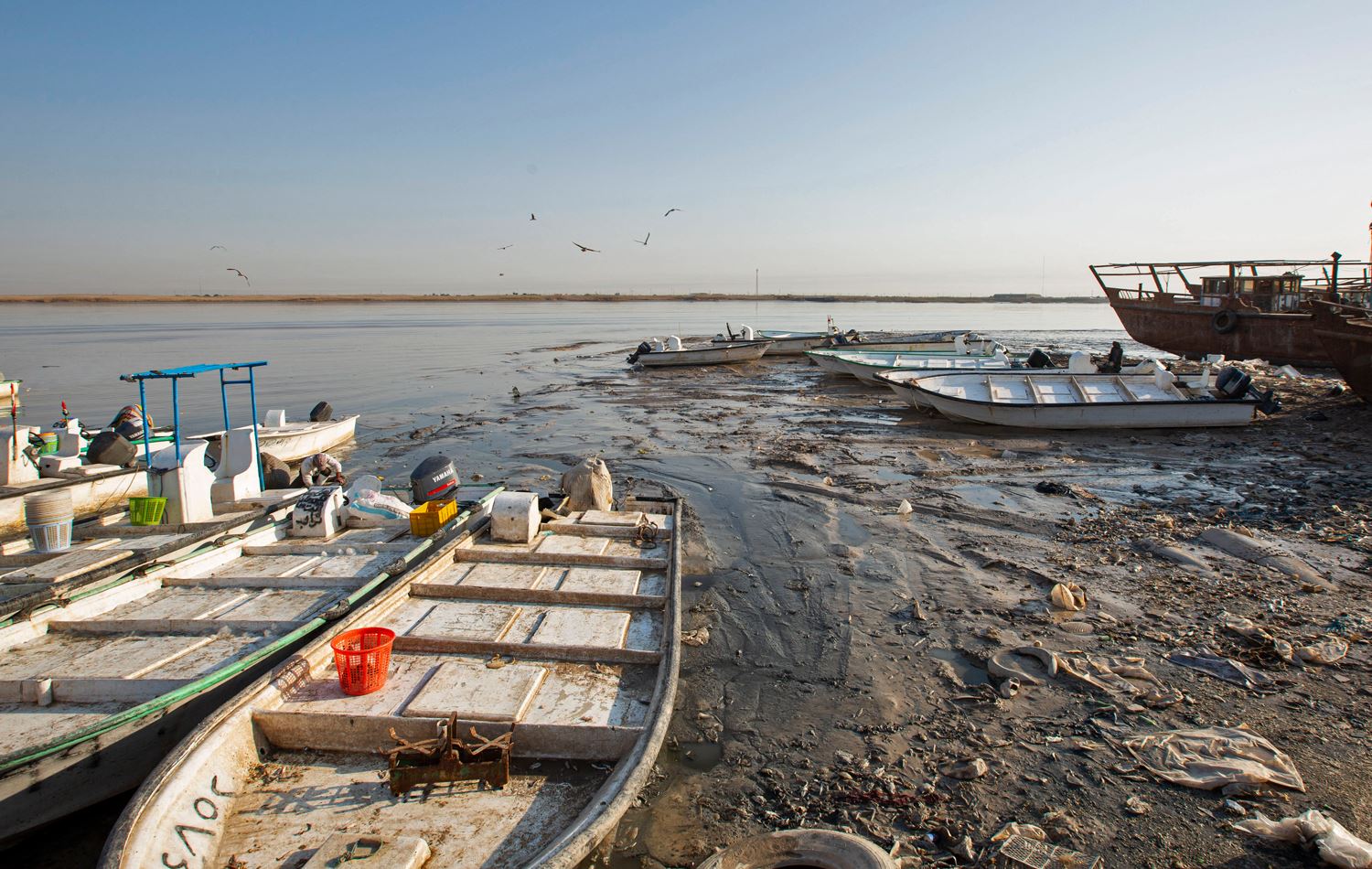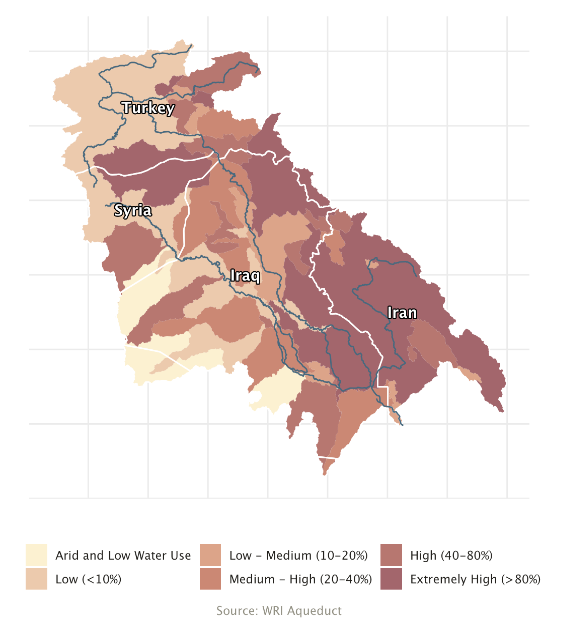
Duhok dam's depleting water levels, in the Kurdistan Region's Duhok province, taken in December 2021. The water is low enough that you can walk across and enter a previously submerged school. Photo: Alannah Travers/Rudaw
ERBIL, Kurdistan Region - Water stress is a severe issue across vast parts of the Euphrates and Tigris rivers, challenging cross-border water governance and cooperation among Turkey, Syria, Iraq and Iran, says a new European Union-funded report into the predicted impact of climate change and water resources in the region, calling on structural changes to water governance and the enforcement of tougher legislation to preserve reducing supplies of water in the fifth-most vulnerable nation in the world to the effects of a heating climate.
The Euphrates and the Tigris rivers both originate in Turkey and form the Shatt al-Arab basin in southern Iraq before discharging into the Persian Gulf; the Euphrates crosses Syria and Iraq, and the Tigris flows to Iraq directly from Turkey, with Iran contributing 9% to the flow of water. Turkey contributes 90% to the Euphrates, with 10% of the water flow from Syria. As for the Tigris, the remaining water is split 40% from Turkey, and 51% from Iraq.
The United Nations Environment Programme (UNEP) has long warned that the water available in Iraq is set to decrease by around 20 percent by 2025, threatening the long-term stability of Iraq’s agriculture and industry. According to a concerning report by the United Nations, dams built in neighbouring Turkey and Iran have dramatically reduced the combined volume of the Tigris and Euphrates by up to 60 percent.
Directors of two of the largest dams in the Kurdistan Region told Rudaw in December that they have been operating significantly below their capacity, as a combination of this summer’s lack of rain and water blockages from neighbouring countries reduce available water.
Last year, Iraq’s minister of water resources accused Iran of digging tunnels and trying to alter the natural water flows. Mahdi Rashid al-Hamdani’s ministry in December announced the completion of procedures to file a lawsuit with the International Court of Justice against Iran and went even further, claiming that unless urgent action is taken to combat both declining water levels and climate change, the Euphrates and the Tigris will be entirely dry by 2040.
Related: 'Nothing but PR': water ministry advances taking Iran to court
At the time, the decision was criticised by environmental expert and founder of Nature Iraq, Azzam Alwash, who told Rudaw English that the lawsuit was “a load of hot air” and nothing but a PR-move that would lead to no solutions.
“The blame should be on Iraq for not taking advantage of the last 20 years to modernise irrigation - it’s far too easy to blame Iran,” Alwash said.
A new EU-funded CASCADES report, which is also available in Arabic, follows this train of thought, setting out concerning findings but pushing for better institutionalised cross-border cooperation between the countries, aided by support from the international community, in what they suggest might help to strengthen both dialogue and mediation among the riparian countries, and the internal governance - and legislative enforcement - of their respective water systems.
The study, by a group of researchers based in Germany, focuses on three different risks that are affected through climate-related water challenges and the usage of water from rivers and wetlands for various purposes: livelihoods and food security, political stability and violence, and interstate conflict and cooperation. It notes that the riparian countries have begun the implementation of adaptation efforts, although far more urgent work is needed to mitigate these risks.
In advance of an online panel event to discuss the report on Wednesday, written with a lens on how instability in the Middle East might impact Europe, one of its authors, André Müller, explained the report’s findings to Rudaw English from Berlin on Thursday.
The water resources management consultant at the Berlin-based think tank Adelphi set out the obvious threats posed by climate change; an effect felt most crucially through water - a combination of less snow and rainfall and higher temperatures, and the implications this has on agriculture, and pastoralists (herders) and the wider population. However, while climate change can negatively affect water resources in the basin, other factors, like the way water is managed (or mismanaged), are crucial for deciding how strongly climate change impacts will hit farmers or households, he said.
Downstream in Iraq, as the sea levels rise in the Persian Gulf, salt water from the Shatt al-Arab basin is pushing far up along the river, causing farming land in southern Iraq to become saltier, ruining drinking water supplies and rendering much agricultural water unusable; more than 80 percent of the basin’s water is used in agriculture.
There are not nearly enough wastewater treatment facilities, Müller explained, giving an example of one practical response that could be taken to mitigate the worst effects of these changes. With less rainfall and more evaporation leading to lower river flows, there are strong ramifications for the quality of water as pollutants become more concentrated.
The report’s main recommendations, then, are to provide international support to the basin countries to reform their water management in water-intensive sectors, and to assist these countries to strengthen their overall security by devising adaptation options. The phrase “structural change” is often bandied around, but in this case some suggestions are proposed: a balance of decentralised and centralised governance of water supplies, the empowerment of civil society organisations to sustainably manage local water sources, and, in some cases, greater leverage of the private sector.
In even simpler terms, Iraq urgently needs to consume less water, reduce the sources of pollution into its water, like preventing the discharge of sewage directly into its rivers - in short, using what resources it has more efficiently. Flooding practices, Müller continued, are highly inefficient as an irrigation approach, especially as so much of the water evaporates in the country’s summer heat. The entire river ecosystem is connected, so cooperation on this front is needed across the rivers’ countries to ensure that rivers will be able to provide clean water or fisheries to humans.
The issue is by no means simple, and the report tells a more considered, nuanced story. “We need to be careful about the story we tell about climate change and water,” Müller cautioned, reiterating that while water conflicts are a threat, climate change is just one factor at play. “The way we manage water strongly affects how the effects of climate change will impact people in the basin of the Euphrates-Tigris river."
Related: Iraq lacks capacity to manage climate change: EU report
The recommendations urge the international community to take a more active role in this process. “The EU has an interest in the stability of the region, and water can be a source of tension between countries,” Müller added. “The EU should support cooperation between the countries in the basin that could help lower the adverse impacts of climate change on water and possible cross-border tensions.”
Iraq and Syria signed an agreement on water in July, with a statement from the Iraqi Water ministry at the time committing both sides “to activate joint cooperation, exchange experiences, intensify the holding of technical and administrative meetings between the two sides and share the damage resulting from the decrease in water imports.” In September, an Iraqi delegation visited Turkey to discuss the decrease in water levels in the Tigris and Euphrates rivers in Iraq; at one stage, down by more than 50 percent.
Yet a separate paper recently published by the EU Institute of Security Studies (EUISS) warned that Iraq lacks the capacity to tackle climate change with ill-prepared government structures, bad governance and policies that contribute to exacerbating negative environmental impacts. An additional report by the Water, Peace and Security (WPS) partnership, released on Thursday, looking further at the water challenges and conflict dynamics in southern Iraq calls the issue an “under-researched crisis,” but one that is - finally, at least - receiving greater attention.
As it stands, water resource management in the Middle East is not evidently sustainable, despite tentative steps in the right direction; so far, all assessments conclude that Iraq is doing far too little on this front. To prepare for the impact of a heating climate, better water governance is urgently needed. An online panel event to discuss the CASCADES report will be live-streamed on February 23, 2022, from 2PM Arabia Standard Time (AST). Speakers include: André Müller, Dr. Martina Klimes, Süha Umar (former Turkish ambassador to Jordan), and Dr. Hassan Janabi (Iraq’s former minister of water resources).









Comments
Rudaw moderates all comments submitted on our website. We welcome comments which are relevant to the article and encourage further discussion about the issues that matter to you. We also welcome constructive criticism about Rudaw.
To be approved for publication, however, your comments must meet our community guidelines.
We will not tolerate the following: profanity, threats, personal attacks, vulgarity, abuse (such as sexism, racism, homophobia or xenophobia), or commercial or personal promotion.
Comments that do not meet our guidelines will be rejected. Comments are not edited – they are either approved or rejected.
Post a comment